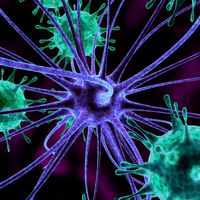Login
Subscribeneuroscience, neurodegeneration, disease & medicine

Reduced Adult Neurogenesis Linked with Alzheimer’s Disease
Abby Olena, PhD | Feb 1, 2021 | 6 min read
Manipulating the production of new neurons can improve cognition in animal models of the disease, raising the possibility that figuring out a way for humans to make more neurons could make a difference for people with dementia.

Alzheimer’s-Linked Mutation Causes Blockages in Neurons
Ian Le Guillou | Nov 20, 2020 | 3 min read
The variant causes a buildup of BACE1 protein in axons in cultured neurons and mice. Researchers say it might be time to rethink failed trials that inhibit BACE1 to treat the neurodegenerative disease.

First Alzheimer’s Blood Test Rolled Out for Clinical Use in US
Shawna Williams | Nov 2, 2020 | 4 min read
The test will be a cheaper and more accessible alternative to currently available diagnostic tools, researchers say.

New Drug Combo for ALS Slows Decline in Small Clinical Study
Jef Akst | Sep 3, 2020 | 3 min read
After six months, patients with fast-progressing amyotrophic lateral sclerosis who had received the experimental treatment had less loss of function than those who received a placebo.

Experimental Blood Test Could Flag Alzheimer’s
Kerry Grens | Jul 29, 2020 | 2 min read
New studies show that elevated levels of a form of tau called p-tau217 can accurately distinguish Alzheimer’s disease from other forms of dementia, and perhaps even predict it.

Astrocyte-to-Neuron Method Reverses Neurodegeneration in Mice
Ruth Williams | Jun 24, 2020 | 4 min read
The cell conversion strategy restores neurons and motor functions lost as a result of an induced Parkinson’s-like illness in the animals.

Study Finds No Association Between Herpes Virus and Alzheimer’s
Katarina Zimmer | Jan 23, 2020 | 5 min read
While the findings contradict previous studies that have linked human herpesvirus 6 to the neurodegenerative disease, they do not eliminate the possibility of a relationship.

The Scientist Infographics: Editor’s Picks of 2019
Jef Akst | Dec 18, 2019 | 3 min read
This year’s most beautiful illustrations covered topics including the molecular underpinnings of Parkinson’s disease and strategies for tracking marine organisms around the world’s oceans.

Interactive: Biomarkers in Blood Provide a Window into the Brain
Shawna Williams | Dec 1, 2019 | 1 min read
A look at some of the circulating molecules that may indicate various Alzheimer’s pathologies and serve as the bases of noninvasive tests for the disease.

The Hunt for a Blood Test for Alzheimer’s Disease
Shawna Williams | Dec 1, 2019 | 10 min read
Researchers hope circulating biomarkers will enable earlier detection and better monitoring of the neurodegenerative disorder—and perhaps help usher in new treatments.

Infographic: How Air Pollution Could Affect the Brain
Catherine Offord | Oct 1, 2019 | 2 min read
Evidence is accumulating that breathing contaminated air might impair cognition.

Air Pollution May Damage People’s Brains
Catherine Offord | Oct 1, 2019 | 10+ min read
Contaminants in the atmosphere appear to have harmful effects on neurodevelopment and cognitive function.

Genetic Risk for Alzheimer’s Disease Linked to Highly Active Brains
Diana Kwon | Oct 1, 2019 | 5 min read
A growing body of evidence supports the theory that neural hyperactivity and hyperconnectivity precede the pathological changes that lead to neurodegeneration.

Infographic: Is Cellular Waste at the Root of Parkinson’s Disease?
Ashley Yeager | Oct 1, 2019 | 1 min read
Damage to the lysosome, the organelle that removes excess proteins, lipids, and other materials, might be at the root of the disease.

Tau Pathology Present Decades After a Single Brain Injury
Ruth Williams | Sep 9, 2019 | 3 min read
Patients who suffer a traumatic brain injury may exhibit abnormally abundant tau protein many years later, a new in vivo imaging technique reveals.

Image of the Day: Alzheimer’s Genes
Nicoletta Lanese | Aug 19, 2019 | 1 min read
Mutations within the MS4A gene cluster have been linked to changes in protein levels that affect disease risk.

Commensal Bacterium Reduces ALS Symptoms in Mice
Jef Akst | Jul 24, 2019 | 2 min read
Boosting the levels of Akkermansia muciniphila in mouse guts slowed the progression of an ALS-like disease, while two other microbiome members were associated with more severe symptoms.

Mouse Model Shows How Parkinson’s Disease Begins in the Gut
Emma Yasinski | Jun 26, 2019 | 3 min read
Johns Hopkins’s Ted Dawson discusses his lab’s demonstration that misfolded α-synuclein can move from the stomach to the brain and cause physical and cognitive symptoms.

Rapidly Flashing Lights and Sounds Reduces Alzheimer’s in Mice
Jef Akst | Mar 15, 2019 | 2 min read
Exposing mice to an hour of 40-hertz stimuli every day for a week reduced levels of amyloid-β plaques and tau protein, and improved cognition.

Infographic: Viruses on the Brain
Ashley Yeager | Mar 1, 2019 | 1 min read
Pathogens can take various routes to pass the blood brain barrier and damage cells.



